- Home
- Keith Douglass
Terror At Dawn c-21 Page 2
Terror At Dawn c-21 Read online
Page 2
A lightning bolt coursed through the hangar bay, accompanied by a high-pitched screaming sound. The Stinger warhead entered the starboard hatch, flashed across the hangar bay, and slammed into the partially closed port hatch, containing the fire inside. It exploded with a deafening fireball, flames and hot gases engulfing half of the hangar bay, then subsiding into a hard, hot fire engulfing the port side.
“Fire, fire, fire!” the 1MC howled. “Fire in the hangar bay.”
No shit, fire!
“Grab the nozzle!” a petty officer said, shoving Williams toward a hose reel mounted on the bulkhead. “I’m activating the AFFF hose reel. You know how to use it, right?” The aqueous film-forming foam was the preferred method of extinguishing a Class B, or fuel, fire.
“Right.” Williams grabbed the nozzle head. Another sailor fell in behind him to help manage the hose, and then two more behind him. Everyone moved with an economy of movement born of hours of practical damage-control training.
Everyone except Williams. He stumbled over the hose as he took the nozzleman position, fingers fumbling over the moveable U-shaped handle called the bail. He hadn’t spent much time on damage control since a three-day firefighting class in San Diego before deploying but the basics were coming back to him. The AFFF would cover the burning surface and deprive it of oxygen. And in here, with so many fuel lines crisscrossing, lubricants and oils and drums, and the presence of so many aircraft for a possible Class Delta fire, it was the first choice.
The fire was centered against one bulkhead, and had consumed both a toolbox and a stack of supplies left there. It was spreading quickly, reaching out toward a helicopter tied down nearby. If it got the helicopter and started a Class Delta fire, then there would be no chance of extinguishing it. The helicopter would have to be shoved over the side of the ship and into the water.
Bridge
0209 local (GMT +3)
“Where is it?” Brisco shouted, his voice carrying over the babble of damage-control reports now flooding the circuits. “Damn it, I need that contact!”
“We just don’t have it, sir,” Surface answered, frustration evident in his voice. “Small contact, choppy seas — recommend searchlights, visual targeting, and fifty-cal guns, sir.”
“The fifty-cals are already being manned,” Brisco said. He turned to Smith and said, “Get on that floodlight. Find them. You and I seem to be the only one with eyes in our heads.”
“Aye, aye, sir,” she said, already running aft along the catwalk toward the floodlight. She’d only experimented with it once or twice, but she could probably manage it.
She flipped the power switch on, shielding her eyes while she pointed her binoculars in the general direction of where she’d last seen the contact. She flipped the shutters on the floodlight open and aimed them in that general direction. Above her, she could hear the shouts of sailors scrambling to man the fifty-caliber guns.
“There he is!” she shouted, forgetting to depress the button on her sound-powered phone, but her voice carried easily up to the gun crew.
“Roger, we see him,” the gun crew chief shouted down at her. Briscoe came running out of the bridge to stand beside her.
“Weapons free,” he ordered. “Take it out, Chief.”
The hard chatter of the fifty-caliber machine gun drowned out the babble from the bridge. Empty casings rained down on them, bouncing off the steel deck and over the side. Smith concentrated on keeping the searchlights centered on a small craft, nailing it to the water with a spear of light.
The first two seconds of rounds fell short, and then the tracers danced across the small target as the gun crew adjusted their aim. She could see now that it was little more than a rowboat with an outboard motor stuck on it. There were two men standing up in it, their features indistinguishable, but one was yanking frantically on the cord attached to the outboard motor as though it had stalled.
Small waterspouts peppered the water as the fifty-cal rounds stitched a line down the wooden hull, splintering boards into shrapnel. The outboard engine kicked to life, the noise lost in the chatter of the gunfire, but the results evident in the boiling water behind the stern. The boat started to turn away from the carrier, quickly picking up speed. It was listing severely to the starboard side, indicating that at least some of the rounds had found their mark.
“Get them!” Brisco shouted.
The gun crew adjusted their aim, walking the tracer rounds up the wake to the boat. Almost immediately, the results were evident. A few rounds found the outboard motor and then the fuel can. There was a soft whoosh as the gas exploded, the flames immediately obscuring the boat and its occupants. The fire expanded momentarily into a large ball of orange and yellow billowing out black smoke evident even in the dark night. There was a secondary explosion, momentarily doubling the size of the fireball, and then it sank down into a smaller form, eating away at the wooden hull and its contents. The machine gun fell silent. Smith heard one anguished scream, and then nothing more.
She turned to look at Brisco, but he was already gone. The immediate threat eliminated, his priority now was fighting the fire.
Through her feet, Smith could feel the vibrations radiating up from the hull, the odd noises and vibrations induced by water rushing through the fire mains to supply the hose reels and hangar bay. She could see the doors sliding back now as the damage-control crew sought to ventilate the area. A few flames slipped out, licking up the side of the ship. They were one hundred feet below the bridge, but the heat was still palpable.
“Starboard, are you on station?” Surface asked. “Look, there may be more of them. Anything you see, I want to hear about it immediately.”
“Roger, Starboard is in position.” She hesitated for a moment, aware that she should avoid cluttering the circuit with unnecessary chatter, but not able to avoid asking, “The fire. How bad is it?”
“We don’t know. I’ll tell you soon as I hear something. In the meantime, keep your eyes on the water.”
Smith was cursed with an unusually vivid imagination and it kicked in now, trying to distract her from her watchstanding. She could see how the flames below looked, the liquid way that they raced up bulkheads and ceilings, enveloping fire mains and fuel lines, reaching out with tendrils of heat to seek skin and flesh, growing, engulfing the entire ship. She was so far from the water, so far, the equivalent of an eight-story building from it. If the fire grew out of control, how in the world would she ever get off the bridge? The way down to the lifeboat stations would be blocked, too, and she held no illusions about her ability to survive jumping from the bridge wing into the sea. Even if she avoided hitting the part of the flight deck that jutted out, the fall alone could very well be fatal. She saw her crumpled bleeding body floating facedown in the sea, tendrils of blood streaking the water, and a knife fin cutting through the water toward her.
Stop it. You’ve got a job to do. By a supreme effort of will, she forced herself to ignore the pictures her mind insisted on creating, and concentrated on the water. But one part of her mind remained focused on the fire below, asking incessantly just how bad it was.
Hangar bay
0210 local (GMT +3)
Fourteen feet away from the fire, Williams came to an abrupt halt. The heat was already painful on his face and hands, although not yet unbearable. The darker parts of his mind responsible for his self-preservation instincts were screaming loud warnings, trying to force him to turn around. The realization that the fire before him was a wild creature, not a chimera under the control of the damage-control-simulator people, came crashing in. For a moment, caught between the instinct for self-preservation and his conscious knowledge of what had to be done, Williams could not move.
“What’s wrong?” the man behind him shouted. Williams felt the hose slack starting to accumulate around him. “Go on, go on!”
Williams forced himself to take one step, and then another, his hand steady on the hose and the bail, focusing on the base of the fire. He was too
far away now — another ten feet, maybe a little more, and he could unleash the torrential power of his fire hose on the creature before him.
He concentrated on his feet, staring down at the black safety boots’ leather and steel toes, forcing them to move one at a time. The heat grew harder and harder to withstand, but he made himself move. If he didn’t, he would not be the only one in danger. The fire had to be contained before it could spread to the aircraft or the rest of the ship.
“Now!” the man behind him shouted. “Go on, sweep the base!”
Williams flipped back the handle of the nozzle, opening it completely. He staggered backwards as the hose tried to squirm out of his hands, a powerful stream of water mixed with foam shooting out the end of it toward the fire. The hose was bucking in his hands like a python, trying to escape. He clung to it grimly, getting the nozzle back under control and sweeping the stream of AFFF across the base of the fire. He was dimly aware of another fire crew approaching from the other side of the fire, doing the same thing.
Williams moved to his left, putting himself and his fire hose between the fire and helicopter closest to it. Over my dead body, he thought. As he saw the fire start to respond to the cooling water and the suffocating foam, he felt a wild surge of savage glee. Take that, you bastard. And that. Now more confident, he had the nozzle firmly under control, and chose his attack points with more precision.
The effects of the two hoses was starting to be evident. The fire was broken into patches now, fighting against the water and the foam but growing smaller by the minute. Behind it, the bulkheads were charred and blackened, paint peeling off, with twisted lumps of metal that used to be a tool case.
Take that. And that. The fire was almost out now, but Williams felt himself losing control. He longed to run forward and stamp the remaining flames out himself, making it personal. This wasn’t just a catastrophe, it was personal. And by God, he was going to make the fire pay for it.
“That’s enough,” a voice behind him said, and a hard hand clamped down on his shoulder. “Secure the hose. Come on, wild man — that’s enough.”
Dazed, Williams did not respond. A hand reached forward and flipped the hose bail forward, cutting off the stream of foam. Two more men crowded up beside him, peeling his hands off the nozzle and taking the hose from him. They stepped away, holding the still-charged hose, a look of awe in their eyes.
“Wild man, that’s what you are,” the damage-control petty officer said, the gruffness in his voice masking the compliment. “I thought you were going to walk into the middle and start from the inside out.” He turned to the two men now holding the hose. “Set the reflash watch. Stay here until I relieve you.” He lifted his damage-control radio to his mouth and said, “Central, Team Leader. Fire out. Reflash watch set. Sending the investigator to check for damage in the adjoining compartments now.”
“Roger, copy fire out, reflash set. As soon as your investigator confirms no damage to the compartment below, I’ll recommend we secure from General Quarters.”
Williams was barely aware of the conversation going on around him. Sudden weariness swept over him as the adrenaline left his system. It had been a long day, too long. Now, he was so tired he could barely stay on his feet.
A corpsman appeared at his side, intense green eyes staring at it at him from behind ugly black-framed glasses. “Let me get a look at you. Come over here and sit down.” The corpsman took him by the elbow and led him to a stack of pallets. He made Williams sit and crouched down in front of him.
“Do you know where you are?” the corpsman asked.
Williams stared at him. Of course he knew where he was. He was in hell, but hell was disguised as an aircraft carrier. Just then, he became aware of the ugly stench of burnt metal contained in the smoke around him. He ran a hand over his face, surprised to find that it was unburnt.
“What’s your name?” the corpsman asked.
“Williams. And yeah, I know where I am. At the fire — geez, man, I’m just tired. That’s all.”
The corpsman examined his face carefully. “This is going to be uncomfortable, but it’s nothing serious. Just first-degree burns. You may have some coughing for a while from the smoke inhalation. Don’t you guys know you’re supposed to just contain it until the damage-control team in full suits gets there?”
“I had to put it out,” Williams said numbly.
The corpsman just shook his head. “Next time, don’t get so close.”
Next time. There will be a next time. A wave of despair rushed over him.
Bridge
0230 local (GMT +3)
“Secure from General Quarters,” the loudspeaker ordered. Smith felt a rush of relief. If the fire was out, then there couldn’t be any more danger, could there? No, they would not have secured from General Quarters if there could be.
While the crew was putting out the fire in the hangar bay, the carrier had launched four helicopters from their spots along the side of the flight deck. They were now combing the ocean around the carrier, spotlights illuminating the water below, searching every inch of the sea within a two-mile radius for any other small boats. To the starboard, a small sputtering fire burned, debris from the first boat.
“Smith, put down the binoculars for a minute. I think the helicopters can handle it.” Brisco’s voice was tart but amused. “Captain wants to talk to you.”
Smith let her binoculars dangle from her neck and turned to see the captain of the ship. She had only met him once, during an indoctrination session after she checked on board, and had never actually spoken to him, although she recognized him from his pictures plastered all over the ship.
“Good work, Smith,” the captain said, his voice low and gravelly. He clapped one hand on her shoulder. “You got that guy before he could get off more than one shot. It could’ve been a lot worse if you hadn’t seen it.”
“Thank you, sir,” she said, her voice shaky. Somehow, having the captain talking to her was almost as nerve-racking as the fire.
“No. Thank you. Effective immediately, I’m promoting you from Fireman Apprentice to Fireman. You will be transferred to the engineering department immediately, unless you have some objection.”
“No, sir. Thank you. Yes, I’d like very much to work in engineering.”
“And the chief engineer will be glad to have you. I expect great things out of you, Smith. Remember that.” With that, the captain turned and walked back on the bridge, where he was immediately deluged by damage-control and bridge personnel finalizing their reports on the fire.
Promoted! And transferred into engineering, just like she wanted. For a moment, joy threatened to overwhelm her. But then, hearing a helicopter approach close by, she turned back to the black water surrounding the ship. She might be an engineer, but right now she had a job to do.
TWO
USS Jefferson
Tactical Flag Command Center
0300 local (GMT +2)
On board the Jefferson Admiral William “Coyote” Grant was listening intently to every report that the United States made over the classified circuits. Coyote commanded Carrier Battle Group 14, comprised of the aircraft carrier USS Thomas Jefferson and her air wing, two Aegis cruisers, three destroyers, and two frigates. They’d been on station in the Med for two weeks now, and had just returned to sea following a three-day port call in Italy.
Fire at sea was every mariner’s worst nightmare, and for it to happen to an aircraft carrier was simply unthinkable. That such a massive and powerful ship, the acme of sea power, could be damaged by such a small boat from man’s earliest days of going to sea — albeit now with an outboard motor instead of oars — was almost too much to contemplate.
But then again, nobody had believed that terrorists would have — or even could have — crashed commercial aircraft into the World Trade Center. Although there’d been some intelligence, some early warnings of terrorist agents and aviation warnings, nobody had really though such a thing could happen. They’d focuse
d on the possibilities of crop dusters and biological weapons, dismissing those dangers by pointing out the difficulties of deploying the proper aerosol and deployment systems. The terrorists, when they’d struck, had relied on a far more primitive and effective method, transforming commercial airliners laden with fuel into suicide bombing runs.
Stingers, though — this scenario was one that aviators had been kicking around for decades. The ubiquitous weapons were the poor nations’ answers to almost every problem. Easily transportable, simple to operate, and relatively cheap, they could be brought to bear in almost any scenario.
Recent intelligence reports had done nothing to allay his worries. There were indications that Pakistan had developed a faster, longer-range version of the ubiquitous weapon, which was now making its way into the international arms scene. If that were true, the Middle Eastern nations, with more money to burn than any other region, would have them first. Not even being in the Med instead of the Persian Gulf or the Red Sea made him feel any easier.
If they could reach out and touch the United States, they could get us. It’s a little cooler here than in the Gulf, but even staying buttoned up the whole time in the Med ain’t gonna be pleasant. But what other choice have we got?
Just as the United States reported securing from General Quarters, Coyote’s patience with the crowded compartment reached an end. He snapped, “OK, folks. Show’s over. Everybody back to work. You know what happened — now figure out how we’re going to keep it from happening to us.” People shifted uneasily and began moving out of the compartment, heading back to whatever they’d been doing when they’d heard about the fire.
“Admiral?” a low-pitched female voice said at his side. “I’m going to set condition-two antiair in about five minutes.”
His gaze still fixed on the large-screen display in front of him, Coyote nodded. “Not antisurface?”

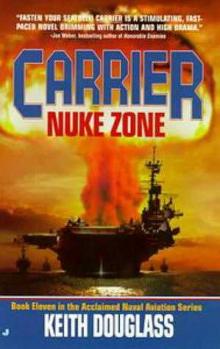 Nuke Zone c-11
Nuke Zone c-11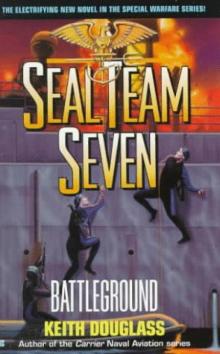 Seal Team Seven 6 - Battleground
Seal Team Seven 6 - Battleground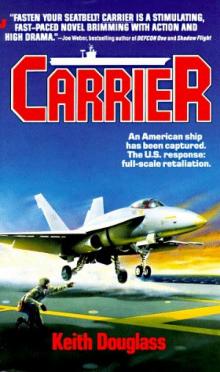 Carrier c-1
Carrier c-1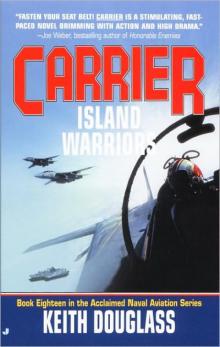 Island Warriors c-18
Island Warriors c-18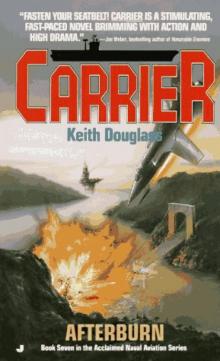 Afterburn c-7
Afterburn c-7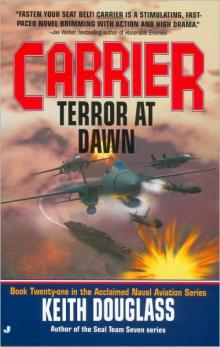 Terror At Dawn c-21
Terror At Dawn c-21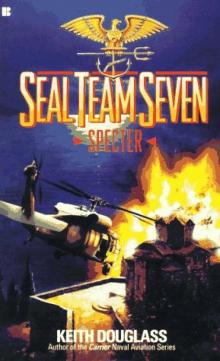 Specter sts-2
Specter sts-2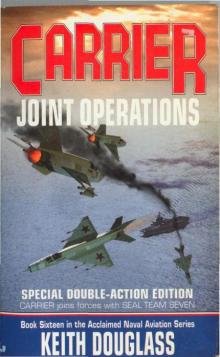 Joint Operations c-16
Joint Operations c-16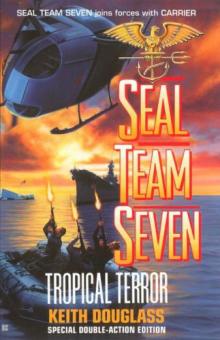 Tropical Terror sts-12
Tropical Terror sts-12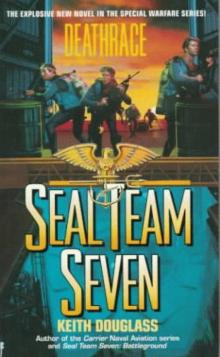 Seal Team Seven 7 - Deathrace
Seal Team Seven 7 - Deathrace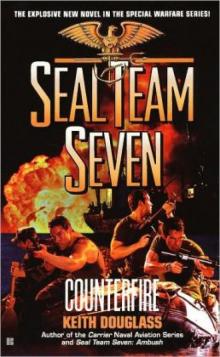 Counterfire sts-16
Counterfire sts-16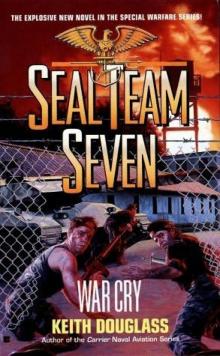 War Cry sts-9
War Cry sts-9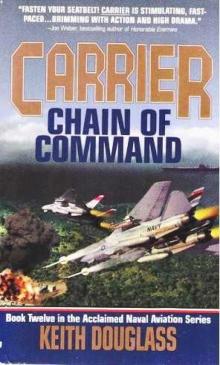 Chain of Command c-12
Chain of Command c-12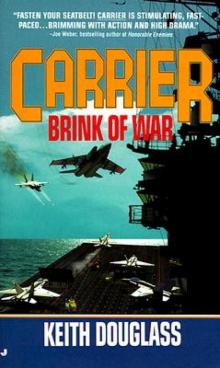 Brink of War c-13
Brink of War c-13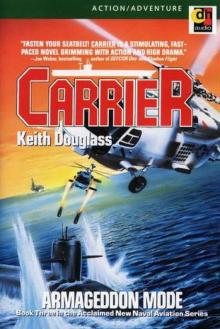 Armageddon Mode c-3
Armageddon Mode c-3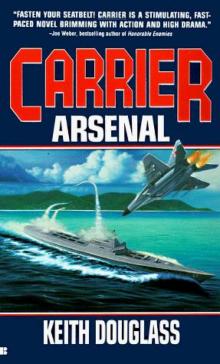 Arsenal c-10
Arsenal c-10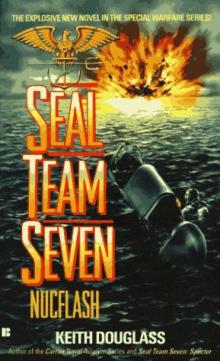 Nucflash sts-3
Nucflash sts-3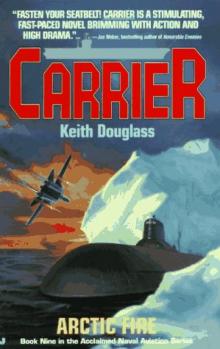 Arctic Fire c-9
Arctic Fire c-9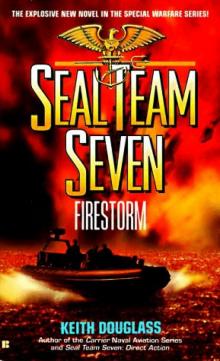 Firestorm sts-5
Firestorm sts-5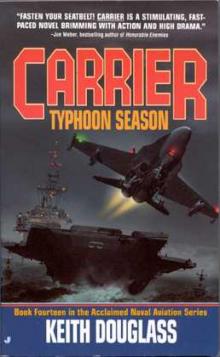 Typhoon Season c-14
Typhoon Season c-14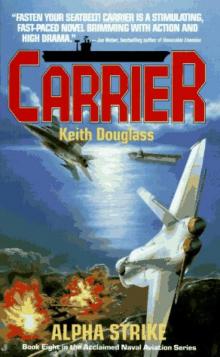 Alpha Strike c-8
Alpha Strike c-8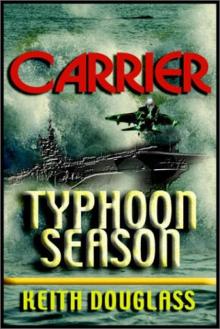 Carrier 14 - TYPHOON SEASON
Carrier 14 - TYPHOON SEASON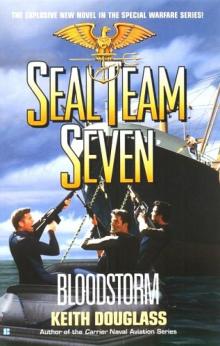 Bloodstorm sts-13
Bloodstorm sts-13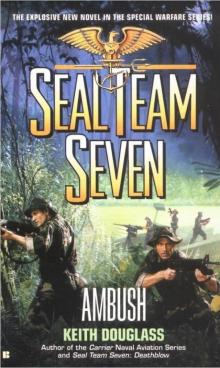 Ambush sts-15
Ambush sts-15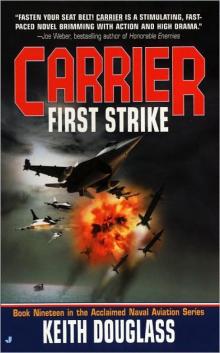 First Strike c-19
First Strike c-19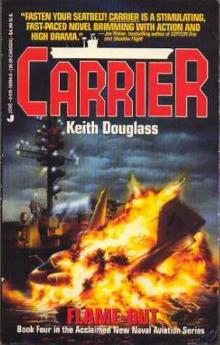 Flame Out c-4
Flame Out c-4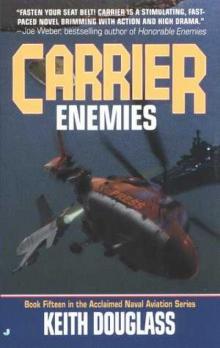 Enemies c-15
Enemies c-15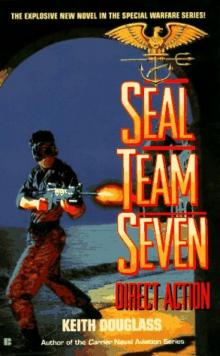 Seal Team Seven 04 - Direct Action
Seal Team Seven 04 - Direct Action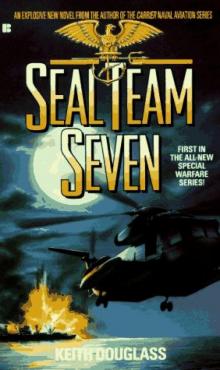 Seal Team Seven 01 - Seal Team Seven
Seal Team Seven 01 - Seal Team Seven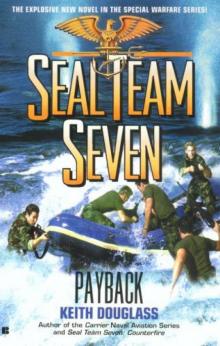 Payback sts-17
Payback sts-17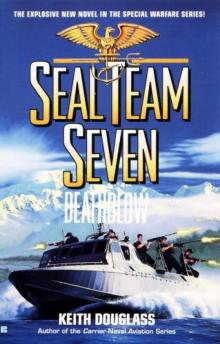 Death Blow sts-14
Death Blow sts-14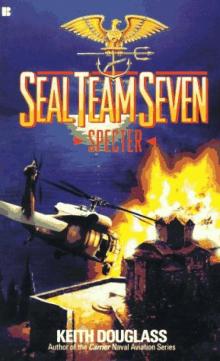 Seal Team Seven 02 - Spector
Seal Team Seven 02 - Spector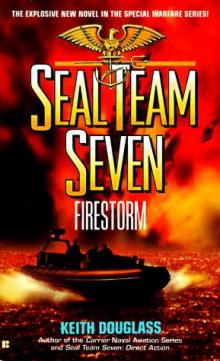 Seal Team Seven 5 - Firestorm
Seal Team Seven 5 - Firestorm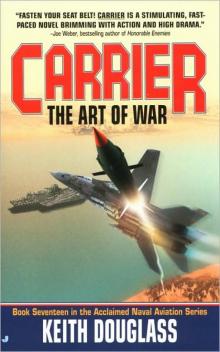 The Art of War c-17
The Art of War c-17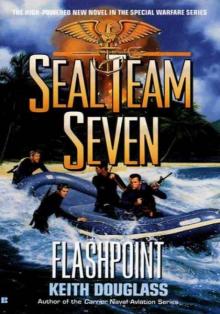 Flashpoint sts-11
Flashpoint sts-11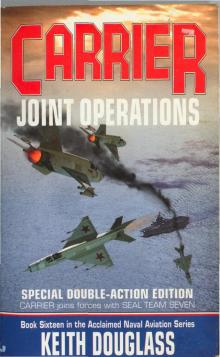 Carrier - Joint Operation Book 16
Carrier - Joint Operation Book 16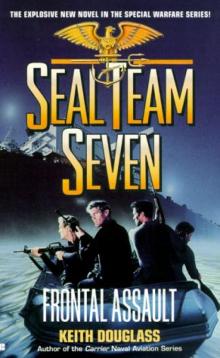 Frontal Assault sts-10
Frontal Assault sts-10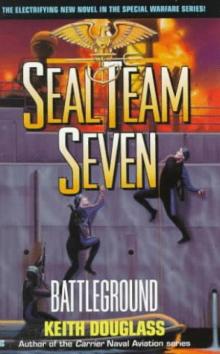 Battleground sts-6
Battleground sts-6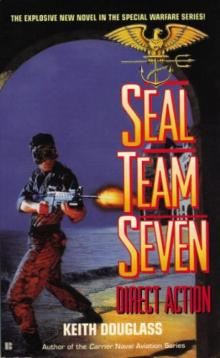 Direct Action sts-4
Direct Action sts-4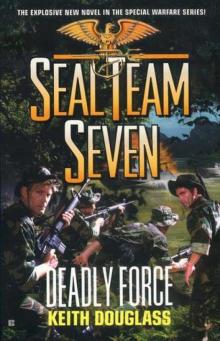 Deadly Force sts-18
Deadly Force sts-18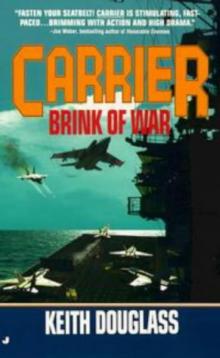 Carrier 13 - Brink of War
Carrier 13 - Brink of War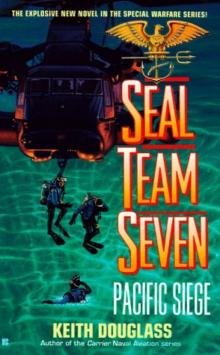 Pacific Siege sts-8
Pacific Siege sts-8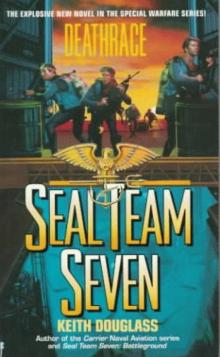 Deathrace sts-7
Deathrace sts-7